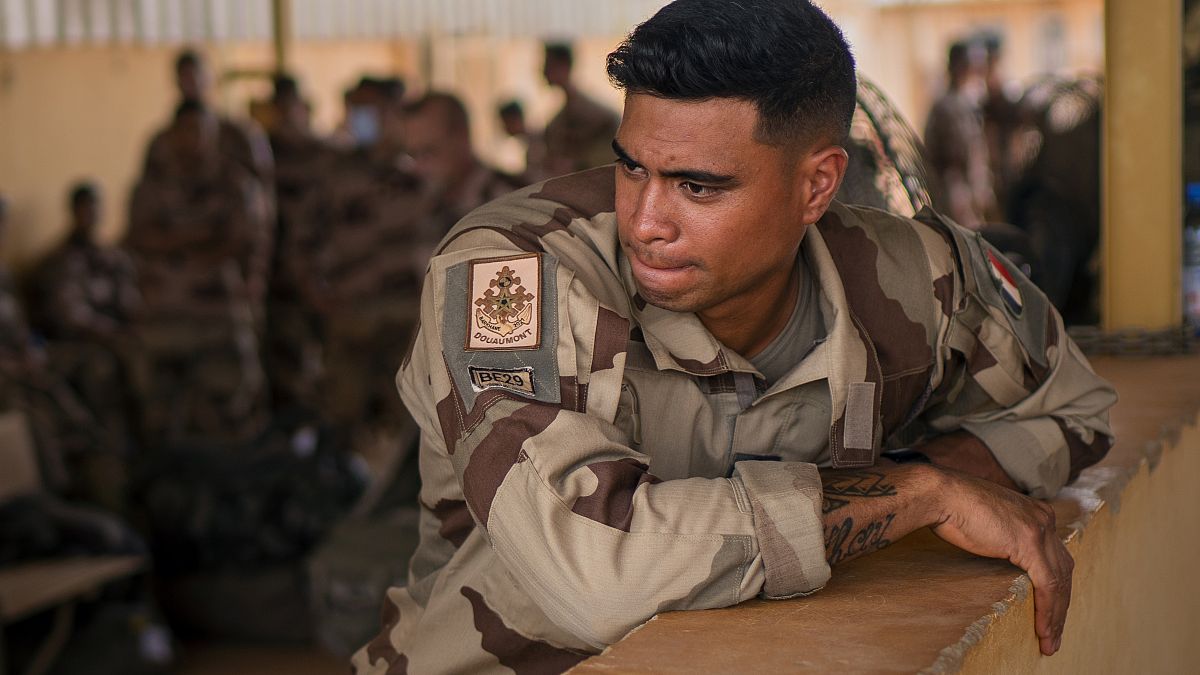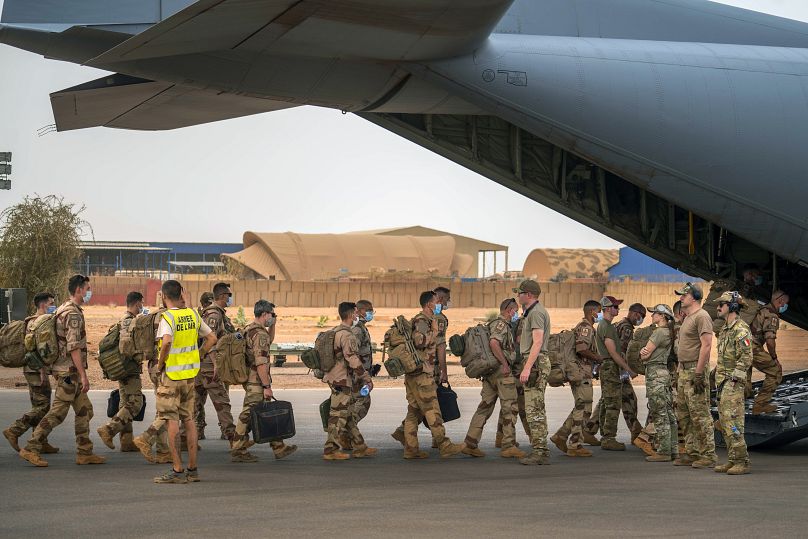Just one month after suspending bilateral cooperation with Mali, France said on Friday that it would resume joint military operations with Bamako after all. What are the reasons behind the reversal?
France's decision to suspend its joint military operations with Malian troops on June 3 was short-lived.
Just one month after freezing military cooperation with the West African nation, Paris announced it was reversing the move, which intended to pressure the military junta in Bamako to restore a civilian-led government after a coup.
"Following consultations with the Malian transitional authorities and the countries of the region (...) France decided to resume joint military operations as well as national advisory missions, which had been suspended since June 3," the French Defence Ministry said in a statement, citing the terror threat as its motivation.
The reversal comes as Paris is preparing to reduce its more than 5,000 troops in the coming months.
French President Emmanuel Macron announced last month the official end of Operation Barkhane, a seven-year mission against jihadist groups linked to al-Qaida and those operating under the banner of the Islamic State group in the Sahel.
France instead will step up its involvement in the European task force, Takuba.
The shift takes place amid a worsening political and security crisis in the region. In May, Mali underwent its second coup in less than a year.
Recent attacks in Burkina Faso and Niger have furthermore sparked concern that France's reduced presence will create a vacuum that will benefit jihadist groups.
Why did France backtrack and resume joint military operation with Bamako, even though civilian rule has not been restored in the country?
Euronews explores the real reasons behind France's reversal and its implications for the fight against terror in the Sahel.
'Few other options'
Michel Goya, a military historian and former colonel in the French Marines, told Euronews that France's reversal was a "logical step" considering that Paris had "few other options."
The suspension of military cooperation with Bamako "couldn't go on forever," he told Euronews. "It was not possible, it was only a political act. It was necessary for President Macron to show his disapproval with the course of events in Bamako," but it was "above all symbolic."
"At some point, you have to be in contact with the Malian armed forces," he insisted.
Goya noted that the French government announced it had obtained "guarantees" from Bamako but the details have not been disclosed.
"Are they guarantees about what the government is willing to accept in negotiations with the jihadists? We don't know, those are only speculations," he said.
'Erratic tactics'
Caroline Roussy, a researcher at the Institute of International and Strategic Relations (IRIS), told Euronews that France's reversal on its cooperation with Malian forces "gave an impression of erratic tactics."
"We don't see where this is going," she said.
Roussy noted that despite the upcoming end of Barkhane, French forces in Mali "oddly" seemed to be currently "very active" with the French Army issuing daily communications on its operations.
Of course, she told Euronews, the end of Barkhane "is scheduled for January 2022 so we can imagine that the 5,100 troops are not going to stay there doing nothing until then."
"Is it the last big push before the end?" she wondered, noting that the French government probably wants to showcase results in Mali ahead of the 2022 presidential election.
Roussy also raised the possibility that France's move could be a message to other world powers tempted to expand their influence in the Sahel as Paris scales down its troops.
In an op-ed for Euronews, French policy analyst Nicolas Tenzer wrote that France's policies in Mali were shaped by "the need to counter Russia’s creeping influence in the Sahel."
France 'struggling' to mobilise other European countries
Takuba currently includes 600 troops in Mali. While half are French, the international task force also relies on Estonian, Czech, Swedish and Italian soldiers. Romania has also pledged to contribute.
"The real novelty with Takuba is that these units can be sent to combat, which is a real revolution in Europe," Goya told Euronews. But like all European missions, he added, Takuba is complex to implement. "It always takes a long time or at least longer than if we did it alone," he said.
Roussy said that the European force Takuba that was due to take over for Barkhane was facing "difficulties," with France struggling to mobilise its European partners.
Many other EU countries have political systems that do not allow the engagement of military troops abroad as easily as in France, while also facing reluctant public opinions, Roussy noted.
In this context, hundreds of Malian troops are due to integrate into Takuba, another "oddity" for what was supposed to be a European force, the expert told Euronews.
Barkhane's mixed results
According to Goya, the launch of the Barkhane operation was "a mistake."
"I was one of those who thought that after the success of the Serval operation, we had to withdraw rather than stay in the midst of the problems," Goya told Euronews.
Serval was launched in 2013 when French troops intervened to force jihadists rebels from power in towns across Mali's north.
Operation Serval was later replaced by Barkhane and was expanded to include Chad, Niger, Burkina Faso and Mauritania.
"It was a mistake, first of all because didn't invest the necessary resources," Goya said. "This mission, which consisted in exerting pressure on the enemy, required substantial means and the first thing we did was to reduce all our forces in the Sahel."
Another issue is that the expected "changing of the guard from Malian troops never arrived," the military historian told Euronews, pointing to structural problems of training and corruption.
After reaching a "disastrous situation" in 2019, France boosted its troops and resources while using new tactics, such as armed drones, Goya said.
The change of method paid off, according to the expert. "We went from 20 enemy combatants eliminated every month to about a hundred," going back to the same levels as those observed during the successful Serval operation.
"So militarily, we're doing better," Goya told Euronews."The problem is that it's coming too late."
"On Monday we will enter our eighth year of engagement so we are starting to reach a record duration for a French military campaign."
"We are coming to the limits of what the public opinion is capable of accepting, quite simply," the military expert told Euronews.
He noted that opinion surveys conducted last year showed that a small majority of French people were against keeping troops on the ground in Mali.
Looking ahead
Speaking about the upcoming end of Barkhane, Defence Minister Parly said on Friday: "This transformation does not mean we're leaving the Sahel, nor that we are going to slow down our counterterrorism operations" in the region.
"We, Europeans, have a collective responsibility to secure the southern flank of Europe. It is essential not to allow the Sahel and more broadly Africa to become a shelter and expansion area for these terrorist groups," she added.
France may want to continue intervening in the Sahel from other countries, Roussy and Goya told Euronews, mentioning Niger as a possibility.
"80% of our human losses are in Mali," Goya said, "so the idea is to withdraw from the area where risks are higher for us."
"Even if we leave Mali, we remain capable of returning there in two days," if needed, Goya told Euronews, citing the Serval operation of 2013 as a precedent. "We deployed a battalion in two days and a brigade in a week."
Every weekday, Uncovering Europe brings you a European story that goes beyond the headlines. Download the Euronews app to get a daily alert for this and other breaking news notifications. It's available on Apple and Android devices.
_Note: The title of expert Michel Goya was corrected on July 18. _

